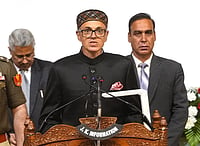IN computerised, climate prediction models of our planet, the El Nino phenomenon has by and large acquired the status of God. In media noise it rivals Bill Clinton. In roguery it has acquired international dimensions. It's making Indonesia drier than normal, bringing drought in south-east Asia, showering Chile, Brazil and California with heavy rain and, of course, arbitrating the subcontinent's monsoon. This year the bite of El Nino has been the worse since 1982-83, spawning a whole new brand of theories—some scientists suspect the phenomenon might even be related to global warming.
The Ecological Debt-Trap
Why is Gujral nodding when Clinton says the South has to take some blame for global warming?

Which fact, of course, chalks a destiny for El Nino that has much to do with what Clinton does or doesn't. And if the US president's statement last month on the treaty to fight global warming is anything to go by, we might be headed for more turbulent times.
First, the controversial parts of Clinton's statement.
What's even more peculiar is Indian prime minister I.K. Gujral's endorsement of the economic declaration on Promoting Shared Prosperity at the recent Commonwealth Summit in Edinburgh. The declaration underlines that "after Kyoto," where 160 nations will meet to thrash out a climate change treaty in December, "all countries will need to play their part by pursuing policies that would result in significant reduction of GHG emissions." If Gujral is serious about what he has nodded assent to, it marks a significant change in Indian policy.
Says Sunita Narain, deputy director at the Centre of Science and Environment: "This endorsement marks the beginning of the end of the most important principle of global environment policy—that of 'common but differentiated responsibility'. This principle, central to negotiations at Rio in 1992, recognised that the North should take responsibility for carbon emissions—80 per cent of the emissions come from 20 per cent of the world population in the North."
According to R.K. Pachauri, director of the Tata Energy Research Institute, "there are 2 billion people in the South for whom development means a single electric bulb and clean water. The US position might deny these people the very basics of existence. The position of the Indian government shouldn't cater to the North. "
?While the US president hasn't exactly spelled out what he wants from developing countries, the statement signals a shift in US policy too. Earlier, the US didn't want the South to take binding commitments but settle on projects of joint implementation and emissions trading—a system of trade-able emission permits which allow firms that offset emissions in their home countries with investments in emission-reducing projects abroad. But, says Narain, Gujral has played into the hands of the US anti-global climate treaty lobby which has recently launched a $13 million advertising campaign. The US lobby's goal: 'developing a country responsibility'. It doesn't want the US to take all responsibility for global warming because that would affect the economy.
Clinton's decision drew flak from various environmental groups and scientists. Says Alden Meyer, office-bearer of the Union of Concerned Scientists: "We think of Clinton's proposal as too little, too late."
THE current US position could in fact doom the Kyoto talks. At a recent meeting at Bonn in Germany, a prelude to the Kyoto conference, the G-77 countries and China veered towards a position in which any US-inspired attempt to elicit commitments from developing countries would be viewed negatively. Says Vijay Sharma, joint secretary in the ministry of environment, who was at Bonn: "The meeting was devoted mostly to develop a legal instrument to make environment commitments binding and in accordance with the Berlin mandate in which only developed countries have a timeframe for reducing GHG emissions."
With recent balance of evidence suggesting discernible human influence on global climate, specially increased temperatures because of the atmospheric trapping of carbon dioxide, there's a sense of urgency in some nations, mainly island countries threatened by rising sea levels, to see a global climate treaty in place soon. The Alliance of Small Island States wants developed countries to pledge to reduce their carbon emissions to 20 per cent below the 1990 levels by 2005. That might be unrealistic keeping in mind domestic compulsions, specially the US automobile industry.
According to the Goddard Institute of Space Research in the US, the 10 warmest years on record were the last 15 years. The '90s have been warmer than the '80s. The impact of the changing climate:
Of course, reduction of GHG emissions to 1990 levels isn't enough. Moreover, not only are current commitments inadequate, countries like the US, Canada and Australia were till recently not willing to take on legally binding commitments. With Clinton now hinting that the US position might be determined by how much developing nations 'meaningfully participate', Kyoto looks set to follow a collision course. Says Pachauri: "There might be some move by developed economies that if a South nation achieves a certain per capita income it should set a target for GHG emissions. That would be a disaster for developing economies which still depend on fossil fuels."
A more just index would be as developed by environmentalist Kirk Smith in 1991. Arguing that global warming has been caused not just by annual emissions, Smith says cumulative emissions from 1990 should be calculated to see what the 'natural debt of a nation' is. He also contends that countries that have borrowed heavily from nature need to pay an ecological debt. But though the 'Polluter Pays Principle' was common in OECD negotiations, it hasn't been accepted in the FCCC.
With the Kyoto meet nearing, US intransigence might prove costly for earth's long-term interests.




















